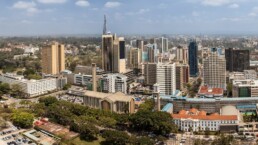Purity Wambui
Share
The hairdresser at Nairobi’s Kenyatta Market, the woman selling oranges on the pavement at the ‘Bus station’, the hawker who sells umbrellas just when the rain begins to fall and the young men selling groundnuts on Ngong Road (one of Kenya’s busiest highways) are just a few examples of the numerous informal traders in Kenya.
This informal sector is estimated to sustain 60 – 70 percent of African families. Informal trade, however, is not limited to this scope. It also includes cross-border trade activities that are not included in a country’s national income. This would include the young lady who travels with clothes from Uganda to sell in Nairobi or the man who transports sugar from Somalia across the border to sell in Kenya. The scope of informal trade is large, ranging from agricultural products to manufactured goods. Informal trade is said to account for a significant proportion of regional cross border trade. In Sub-Saharan Africa, it is estimated to provide 20 to 75 percent of total employment. The range of figures is large as it is quite impossible to get accurate statistics on informal trade due to the very nature of this trade. Pervasive informal cross-border trade in Africa can be attributed to high tariffs, and non-tariff barriers such as sanitary and phytosanitary measures, compliance to which can be costly. As a result, traders resort to informal trade in an efforts to avoid these measures.
If informal trade provides employment, sustains families and meets demands within the economy, why then should African governments be concerned about it? The main reason is generation of government revenue through taxation which can catalyze local development, and this will happen when trade is formalized.
Intra-Africa trade has been identified as a key to boosting economic growth in Africa. However, intra-Africa trade levels are low. Intra-Africa trade stood at 18% of total exports in 2016 and 11.9% in 2017. These figures only represent formal trade across borders. They do not capture the full extent of trade on the continent as they fail to take into account the vast and ubiquitous level of informal trade within Africa. There is need to increase intra-African trade and efforts in this regard are already underway; the most notable one being the development of Africa Continental Free Trade Agreement (AfCFTA). However, there is also the need to give adequate representation and cognition to the high levels of informal trade happening within and between countries. This will ensure that policy makers can be well informed when developing policies required to propel their countries and the continent toward higher development. In order to do this, the informal traders need to be included in the formal trading system.
The question that then arises is how to ensure that informal cross-border trade can be formalized. It should be noted that various governments have attempted to do so before in their countries. In an effort to formalize informal cross-border trade, governments can take the following steps:
- Reduction of tariffs: Traders who face high taxes at the border would be incentivized to avoid these costs particularly where they are unable to pay. In cases where demand is high, a trader will avoid paying the tariff than avoid trading at all. The Africa Continental Free Trade Agreement (AfCFTA) is a step towards tariff reduction. It aims to create a free trade area which according to requires that duties and other restrictive regulations of commerce are eliminated on substantially all trade between the countries forming the free trade area.
- Streamlining of regulations: While reduction of tariff barriers can encourage more informal traders to formalize their trade, many may shy away from doing so where non-tariff barriers are high and discourage entry into foreign markets. Non-tariff barriers could include regulatory requirements such as labelling requirements, high costs of visas and work permits, and sanitary and phytosanitary measures. There is need for governments to work together to streamline their regulations. Again, the AfCFTA could provide an opportunity for the streamlining of these regulations.
- Accessibility to information for informal traders: Governments could also ensure that trade information and requirements are easily accessible to traders. Accessibility requires that information is not only readily available but also easily understandable. As most informal traders may not have high achievement in education, this might require that governments create resource centres where traders can easily obtain information and seek clarity on various requirements. This can be a way of encouraging compliance with trading requirements.
As the continent directs its efforts towards the enforcement of the AfCFTA, it is hoped that there will be economic growth as a result of trade liberalization. Hopefully, it will also enable informal cross-border trade to be formalized towards efficiency and increased output.
Image credit: Etinosa Yvonne
The views expressed in this article are those of the author and do not necessarily reflect the views of Future Africa Forum. Future Africa Forum is a pan-African policy think-tank and policy advisory consultancy headquartered in Nairobi, Kenya.



